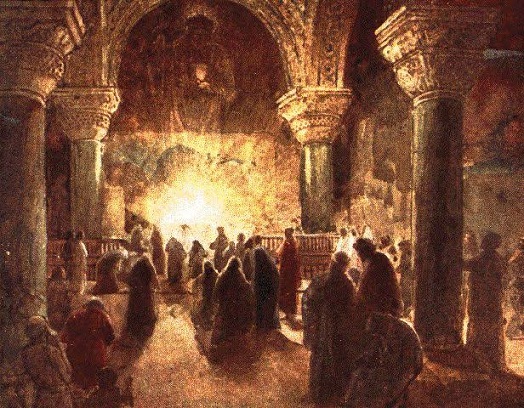
Imagine that you are on a camping trip with your family. Not just your wife and kids, but all of your aunts and uncles and brothers and sisters and cousins. You’re all set up in a big circle facing the middle the camp, and in the center of that camp is a large fire. You see the fire light dancing on the ceiling as you fall sleep. It’s the first thing you see when you step out of the door in the early dawn. What does that fire mean to you? It represents peace, family unity, warmth, protection.
Now, imagine you’re an Israelite. What does the fire in the center of the camp mean to you now? All those same attributes, a hundred fold, enshadowed by the knowledge that the God of your fathers, who has plucked you out of Egyptian oppression and determined the outcome of every battle your family has fought with your enemies, is leading you to the prosperous land that He promised to your ancestors.
The presence of God was a visible, undeniable reality to the Israelites as they followed the column of fire and smoke to the Promised Land and camped around it in the wilderness.
When Israel settled into their new land, however, they set up the tabernacle at Shiloh, went to their new homes and fields and vineyards and promptly descended into the period of the Judges where, as the book tells and demonstrates, no one knew God’s Law and “everyone did what was right in their own eyes.”
The last tragic event of the Judges cycle of idolatry, oppression, crying out, and deliverance actually takes place in the book of I Samuel.
This time Israel’s idolatry had led to oppression by the Philistines, and when defeat is imminent, the sons of the judge, Eli, suggest that they turn once more to their God who has delivered them so often in the past. But their ignorance of Who that God is is so profound that, rather than humble themselves for their incredible wickedness and cry out for help, they treat the ark of God like a pagan idol, carrying it to war, as if that would leverage God into acting on their behalf.
Of course, the ark of the covenant is captured, and Eli’s daughter-in-law, upon hearing of both her husband’s and father-in-law’s death, and in the midst of dying in child birth herself, reveals the deepest object of her heartbreak when she names her soon-to-be-orphaned son, Ichabod: the Glory has departed.
To Israel’s great shame, they had forgotten the God they had encamped around in the desert, the God who made them a people. Without His presence, what even were they but a family of escaped slaves?
Generations passed in this state of shame until Solomon, drawing from the wealth and materials stockpiled for just such a purpose by his father, David, built a wonder of the world, dedicated to Yahweh, a “house for His name.” The splendor of this temple is described in unimaginable terms, the wealth in unimaginable quantities, and when the ark is placed in this new temple and Solomon dedicates the sacred house of worship and leads his nation in a humble prayer of thanks to God, we see that the temple is filled with the glory of God so that the priests cannot enter the temple and God demonstrates that He “dwells” with Israel once more.
Of course, tragically, the cycle of idolatry continues in the time of the kings of Israel, even under Solomon and, at some point unrecorded by the Bible and history, in one of the many lootings of Jerusalem by her enemies, the ark is lost or destroyed. The glorious temple is leveled and its vast wealth carried off with the people of Judah by the Babylonians.
Israel is shamed once again.
This is the state in which we find Israel at the end of the Old Testament. She has rebuilt the temple, but it is so nearly an embarrassment in comparison to the old temple that the oldest generation of returned exiles weep at its dedication.
By the time of the New Testament, Israel is just one of many vassal states of the vast Roman Empire, under the thumb of its thieving tax collectors, in little better state than when they left Egypt. Yahweh’s temple is being remodeled and made more beautiful, not from their own prosperous hands, but by the generosity of their pagan king who is making it a monument to his own greatness. They haven’t heard from a prophet of God in 500 years.
Ichabod: the Glory has departed.
The God who dwelt with them is silent. There’s no ark, no smoke, no fire, a trinket of a temple in memory of the original, no prophet.
And then, one night, some shepherds come racing into to the little village of Bethlehem saying something crazy…
The Child they’ve come to see is not Ichabod, but Immanuel: God with us.
John 1:14 says, “The Word became flesh and dwelt among us, and we have seen His glory…”
Hebrews 1:3 says, “He is the radiance of the glory of God…”
Ancient Israel knew that God was where the column was, or where the ark was, or where the temple was, but we know that Christ dwells with His people. WE are His new temple, and as the column sat above the tabernacle when Israel camped, the tongues of fire sat above the heads of the first Christians at Pentecost.
Our God is with us. Merry Christmas!

Call us:
231-924-4050Email us:
info@americandecency.orgWrite us:
American Decency AssociationCopyright 2025 American Decency